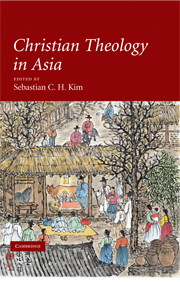Book contents
- Frontmatter
- Contents
- Contributors
- Preface and Acknowledgements
- 1 FORMATION OF CHRISTIAN THEOLOGIES IN ASIA
- 1 Introduction: mapping Asian Christianity in the context of world Christianity
- 2 The Mystery of God in and through Hinduism
- 3 Waters of life and Indian cups: Protestant attempts at theologizing in India
- 4 From abandonment to blessing: the theological presence of Christianity in Indonesia
- 5 Studying Christianity and doing theology extra ecclesiam in China
- 6 Christian theology under feudalism, nationalism and democracy in Japan
- 7 The Word and the Spirit: overcoming poverty, injustice and division in Korea
- II THEOLOGICAL THEMES OF CHRISTIANITY IN ASIA
- Index
- References
2 - The Mystery of God in and through Hinduism
Published online by Cambridge University Press: 05 June 2012
- Frontmatter
- Contents
- Contributors
- Preface and Acknowledgements
- 1 FORMATION OF CHRISTIAN THEOLOGIES IN ASIA
- 1 Introduction: mapping Asian Christianity in the context of world Christianity
- 2 The Mystery of God in and through Hinduism
- 3 Waters of life and Indian cups: Protestant attempts at theologizing in India
- 4 From abandonment to blessing: the theological presence of Christianity in Indonesia
- 5 Studying Christianity and doing theology extra ecclesiam in China
- 6 Christian theology under feudalism, nationalism and democracy in Japan
- 7 The Word and the Spirit: overcoming poverty, injustice and division in Korea
- II THEOLOGICAL THEMES OF CHRISTIANITY IN ASIA
- Index
- References
Summary
INTRODUCTION
The church, the community of the disciples of Jesus Christ, is continuity in discontinuity. It is the continuation of the mission initiated by Jesus Christ, but a discontinuity in so far as this mission implies the fulfilment of every culture, as Jesus came to fulfil and not to destroy. The history of the Indian church, heir to a ‘tradition that sought God with a relentless search’, is a manifestation of the church's hot and cold relationship to the religious and cultural traditions of India. Whereas the earliest community, the St Thomas Christians, considered each religion salvific to the followers of the religion, the age of Inquisition would tolerate nothing of it.
Today Christians in India along with the rest of the Asian Christians are becoming increasingly aware of the Asian roots of Christianity. Though they are largely compromised to a Christianity that has come to Asia in its western form, there is increasing talk of the need to rediscover the Asianness of the gospel teachings and thought patterns.
PART 1 HISTORICAL CONTEXT
A context of pluralism
Traditional Asian thought, while sharing western abstract thinking, is very much context-dominated. The abstraction is not free from the context in which it is made, the reality of the experience. As the Japanese thinker Hajime Nakamura writes:
Europeans generally think of the abstract notion of an abstract noun as constructed solely by means of the universal meaning which is extracted from daily experience, so that they represent it in the singular form; on the contrary the Indians think of the abstract notion as what is included within experienced facts so fused with them that the essential principle is often represented in plural form.
- Type
- Chapter
- Information
- Christian Theology in Asia , pp. 22 - 40Publisher: Cambridge University PressPrint publication year: 2008
References
- 2
- Cited by



